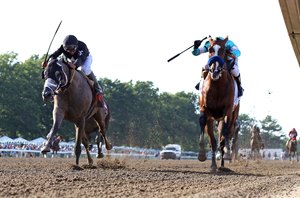New Jersey to Ban Riding Crop Use Except for Safety


A regulation passed Sept. 16 by the New Jersey Racing Commission will prohibit jockeys and exercise riders in the state from using the riding crop "except when necessary to control the horse for the safety of the horse or rider" beginning next year.
The ruling makes it the strictest in North America following earlier decisions by some regulatory bodies that have limited the number of strikes a horse can receive from a jockey. According to Leland Moore, a spokesperson for the NJRC, the riding-crop restriction will take effect when Monmouth Park opens in 2021. The track customarily begins its race meet in May.
The regulation was passed unanimously via teleconference by the commission, according to Moore. This came after objections from the Jockeys' Guild representatives. The regulation was one of several first pitched last fall by the NJRC amid public-perception concerns.
NJRC executive director Judith Nason was unavailable when seeking comment Sept. 17. Last fall, she stated in a news release that the commission was "committed to ensuring the horses are treated humanely and to protecting the safety of all racing participants.”
Anti-racing forces decry the use of the crop on horses, claiming it inflicts pain and causes fear. But jockeys say today's crops are kinder than those of previous eras, having poppers that still produce a loud sound but are unlikely to produce welts. They feel a crop is needed for their protection when the horse might duck in or out, or do something else that could place a rider in danger.
The crop is also used to encourage a horse to run faster and to move forward through an opening when hesitant.
Terry Meyocks, the president and CEO of the Jockeys' Guild, expressed disappointment with the regulation the day after its passage, believing it actually puts horses and riders more at risk.
"People have to realize the safety of the horse and rider is paramount," he said. "But they didn't do it; they're not doing it."
Riding-crop rules vary from state to state and are growing in complexity as more agencies adopt new policies. Meyocks wonders how jockeys will keep tabs on all the rules. Some riders, such as those based in the Mid-Atlantic, ride in multiple states.
"It's typical of our industry. Our industry doesn't work well today," Meyocks said. "It's gotten a whole lot worse because you have a rule in California, you have a rule in New Jersey, you have a rule in Kentucky. You're going to have (Racing Commissioners International) coming up with a rule on their website. You're going to have other jurisdictions not going by anything other than the old, current rule. And I don't think that's in anybody's best interest."
The NJRC regulation also mandated riding crops have a soft tube, like those on the 360 Gentle Touch riding crop designed by retired jockey Ramon Dominguez.
The new regulation states that stewards in New Jersey will be in charge of determining whether a jockey used the crop for a safety reason and will be able to fine or suspend a rider if they determine it was simply used to achieve a better finish. A jockey's share of the purse could also be forfeited for prohibited use of the riding crop.
